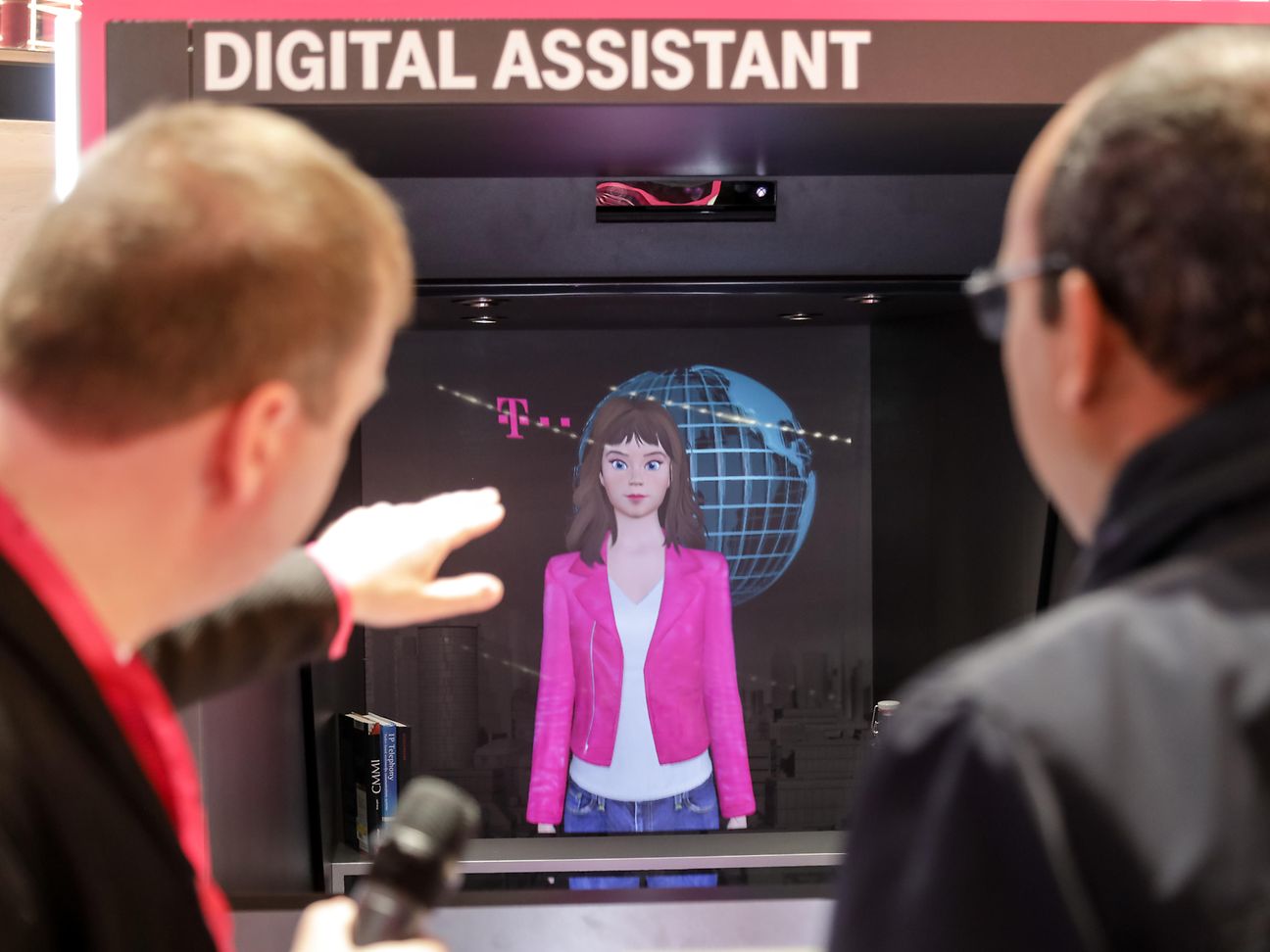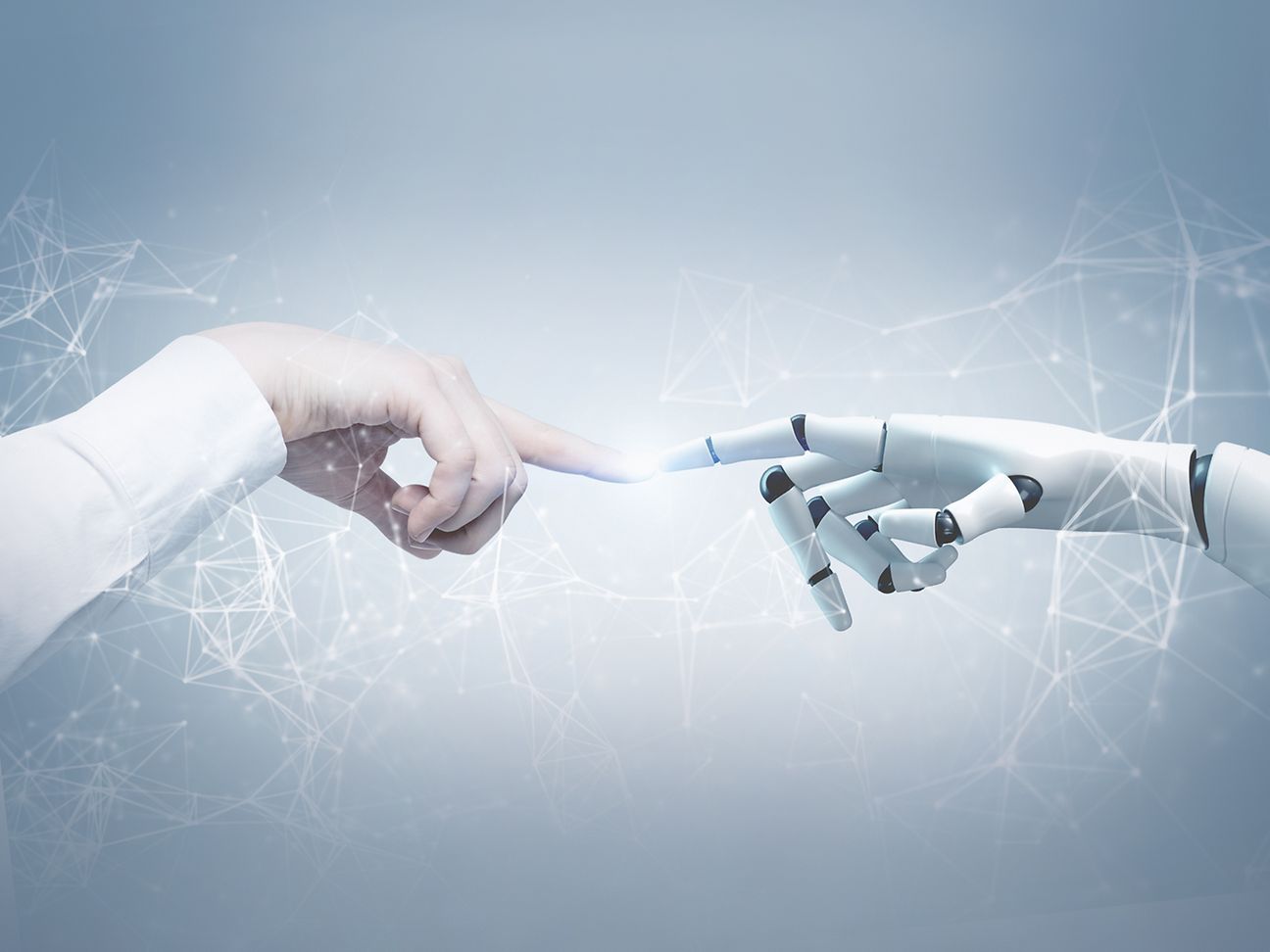

Machines keep getting smarter – with human help
Artificial intelligence (AI) doesn't always have to be packaged in robot form. It can be integrated in computers, voice control systems or chatbots that serve as virtual assistants. At Deutsche Telekom, development of AI systems is an important priority.
Instead of buying "off-the-shelf" AI systems and robots, which can be expensive, Deutsche Telekom is developing its own AI solutions – via its developer teams, and with the support of partners. And it is testing AI-based software, computers, voice control functions and chatbots, with a view to making customer service more efficient, for consumers and corporate customers alike.
Standard queries from corporate customers can easily call for a thousand manual actions in various software systems – actions such as entering bookings and process commands, and initiating orders. By developing its own smart software for such tasks, the company can thus save considerable time and expense – and nerves!
Chatbots can make customer service more effective and efficient. They can handle routine tasks, and they can be available around the clock. Deutsche Telekom has a range of different digital assistants, most of which are recognizable as such to customers. While they will not be able to replace real human service agents in addressing complex concerns, AI systems will increasingly be able to relieve human agents of standard tasks – and thus give human agents more time for the tasks that only they can do. With this perspective, AI systems are being designed to be able to solve specific customer problems. Virtual assistants such as Tinka, Sophie and Vanda will soon be able to "learn" from chat logs and from real conversations between service agents and customers. They will be able to glean the best solutions and approaches, to remember what they have learned and to apply a growing fund of knowledge. They are also being designed to communicate with customers in ways that sound and feel "human." Significantly, in the interest of coordinating its efforts in this area, Deutsche Telekom has launched an overarching AI program, eLIZA, for the purpose of linking all AI solutions within the Deutsche Telekom Group.
Tinka: a virtual employee at Telekom Austria
Tinka is a chatbot that may be likened to a search engine. To date, Tinka has learned over 1,500 answers, and "her" answers are continually being updated. Tinka is available to assist Telekom customers in Austria at any time of the day – right away, with no waiting time. Tinka appears on customers' screens as an icon depicting a young woman with long hair, and with a box below her for text input. She is able to handle about 80% of all questions put to her. When she can't answer a question, she forwards it to a human colleague.
Although Tinka is already in service, Deutsche Telekom developers are continuing to work with customers to adapt Tinka more closely to customer requirements. And they have continued to integrate new sources of information within her overall information pool. Examples of what Tinka is now able to do include supporting customers in setting up LTE-based home Wi-Fi networks and explaining to customers how to insert SIM cards into their phones. One of her special strengths is that she can forward customers with difficult queries to other, available service channels. She can connect customers to customer service agents. If no agents happen to be available, she recommends email as an alternative channel.
Tinka will soon be able to recognize customers and greet them by name. She will remember previous conversations and be able to refer to them. Tinka will also be able to know – subject to customer consent – what a customer has already viewed on the Austrian T-Mobile website. This will make interactions with her much more specific and focused on customers' precise concerns.
Sophie: Congstar's AI module
Sophie, a service bot and chatbot from Deutsche Telekom's subsidiary Congstar, is supporting the company's service team on the company's website. It also is being used as a chatbot in connection with the Facebook Messenger application.
Sophie is able to greet customers personally, by name. This capability is so effective that it is presenting a challenge on Facebook's popular Messenger service, in the context of the various restrictions imposed by Facebook. Plans call for Sophie, on Congstar's Facebook page, to be able to automatically process most customer queries and to forward any complex queries to the service team. Then, use of personalization and its benefits is to be intensified – for example, in connection with payments. Sophie's artificial intelligence enables her to learn from results and continually improve her customer service output.
eLIZA: AI for many areas throughout the Group
The eLIZA program is backed by a team from Deutsche Telekom's Innovation Laboratories (and other innovation areas), as well as by a design team staffed by T-Mobile Austria and Telekom Deutschland.
"In light of the huge sums that players such as Amazon and Google are investing in AI, we feel it makes great sense for us to concentrate on using AI in customer service – and, in the longer term, on developing various other areas of interest," explains Jan Hofmann, head of eLIZA. "We want to use AI to solve specific customer problems."
The eLIZA program is to serve as a framework for setting up AI-based systems at various locations throughout the Group, and in various countries. Tinka, Sophie and their virtual colleagues will one day be able to learn from chat logs and from real-life conversations between customer service agents and customers. And they will be able to remember and apply the best ideas, approaches and strategies they cull from these sources.
Vanda: The invisible assistant for corporate customers
Large corporate customers will also need to rely on AI. Over the past few years, a
The special thing about Vanda is that it is being designed to process natural language. While many solutions for "self-service" are now available on the market, very few of them are able to engage in natural-language conversations. Still fewer support speech-based authentication. And no other system can match Vanda's ability to handle chat conversation and Facebook- and Viber-based conversation. What's more, Vanda "speaks" more Eastern European languages than other systems do.
The Vanda effort is exclusively about software. "She" does not appear visually. The aspects that development of the system is focusing on include semantics (Vanda's ability to understand language), natural-speech processing, assistance capabilities and suitable behavior. While this is much ground to cover, the system developers maintain that the greatest challenges in connection with virtual assistants are no longer technical ones – they have to do with promoting social acceptance of such systems.
Hub:raum: Recruiting via chatbot
Hub:raum is Deutsche Telekom's startup incubator. Its aim is to promote young entrepreneurs and their ideas – and to put innovative startups in contact with the Group.
For its personnel recruiting, hub:raum uses a digital assistant, the hub:bot. The hub:bot is a chatbot designed especially to answer questions that potential applicants have about posted job offers. Its advantages are obvious. It is available 24/7, and it is very fast, able to answer potential applicants' questions right away.
Recruiters also profit from use of the new chatbot, in that it is able to filter out applicants who lose interest in job offers upon receiving detailed information. HR staff thus have more time to spend with applicants who are suitable, interested candidates.
Needless to say, the chatbot's effectiveness depends in large measure on advance work that recruiters have to carry out. Such work involves correlating fitting questions and answers with each job offer, to enable the underlying data to be suitably digitized for the bot.
The quality of AI-supported robots, computers and voice-control systems always depends on the humans behind the systems – on the experts who provide content and on the IT specialists who turn content into digitized data. Without such support, AI machines cannot become useful virtual assistants.
Mobile Protect Pro
AI is not being used only in customer service and recruiting. It is also being used to protect employees' mobile devices – smartphones and tablets – against the growing threats of cyber attacks.
Mobile Protect Pro, a solution from


